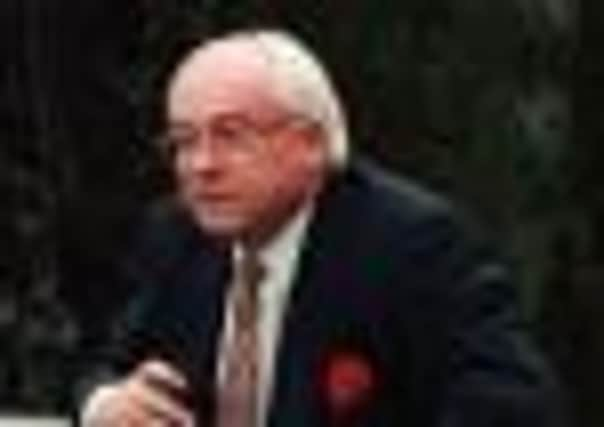Obituary: Freddie Fletcher, businessman who turned the fortunes Rangers and Newcastle football clubs


The death from asbestos-related cancer of Freddie Fletcher has ended a remarkable life that began in relative poverty on Clydeside and saw this “lad o’pairts” become highly successful in politics, sport and business.
Friends have recalled him both as a decent man and a tough businessman – his nickname of “the Rottweiler” was well earned at a torrid time for the club with which he was latterly most associated, Newcastle United.
Advertisement
Hide AdAdvertisement
Hide AdWith drive and unflagging enthusiasm, he transformed the fortunes of one of Scotland’s best known housebuilders, John Lawrence, before doing the same for two of Britain’s biggest football clubs, Rangers FC and Newcastle.
Alfred Fletcher – always known as Freddie – was born in wartime Greenock two months after the death of his father on active service. His mother and he went to live with his grandmother – a family of ten in a one-bedroom house.
Educated at Greenock High School and Strathclyde University, where he obtained a management certificate in business studies, Fletcher loved football from childhood but did not rate himself as a player, saying that he was a poor right half.
When he was five, however, his mother bought him a ticket for Cappielow and a lifelong love affair with Greenock Morton and the Beautiful Game began.
Starting his working life as a management trainee, Fletcher briefly went to the USA, but returned to work in sales and marketing positions with the Mars company and then Kraft and United Biscuits.
In his mid-twenties his interest in politics mushroomed and he became prominent in the Greenock Liberal Party, citing Jo Grimond as his mentor. Elected to the local council in 1966, he went on to serve for 18 years, becoming a Justice of the Peace in 1975 before serving as Provost of Inverclyde from 1977 to 1980.
He also served as housing convenor and police convenor, and it was during his provostship that he was appointed a director of his beloved Morton in 1978 – and all this before his 40th birthday.
His business career took off in the 1970s after he joined the John Lawrence group of companies. He first took charge of the loss-making office supplies division and then proved highly successful as managing director of the private housing division.
Advertisement
Hide AdAdvertisement
Hide AdWhen the Lawrence company took complete control of Rangers, he became commercial director at Ibrox while retaining his role as marketing director of the main group.
The first steps to making Rangers a powerful financial force in its own right were taken under Fletcher, who pioneered special season ticket deals and corporate sponsorship schemes that are used by clubs to this day.
With main shareholder Lawrence Marlborough then living in Nevada, Fletcher formed an alliance with club chairman David Holmes that truly changed Scottish football. For it was they who brought in Graeme Souness in 1986, and his policy of big name signings allowed Rangers to flourish so quickly that Marlborough felt able to sell the club to David Murray for £6 million just two years later.
Fletcher stayed on under Murray and when he left Rangers in 1989, as well as his position with the club, his departure created vacancies for Rangers’ representative on the Scottish Football League, as well as treasurer of the League. He was also on the SFA Council, the Association’s International Committee and the International League Board.
He founded his own marketing company but was soon back in football. Connections made through Rangers’ sponsors Scottish and Newcastle Breweries brought Fletcher into contact with a group of Tyneside businessmen who were trying to rescue Newcastle United, the sleeping giant of English football, which in 1991 was in the Second Division and was threatened with administration because of its bank debts.
Working alongside club chairman, the Gateshead Metro centre entrepreneur Sir John Hall, and others, Fletcher soon became chief executive of the restructured club and the dynamic Scot pulled off a stunning coup when he persuaded Kevin Keegan to manage the Tynesiders.
His background in commerce and marketing saw Fletcher lead United to new heights off the field while Keegan led the club back into the top flight of English league football where they enjoyed several seasons of success without actually winning the title.
In many ways, the present Newcastle United is the legacy of Fletcher, Keegan, Hall, and his successor as chairman Freddy Shepherd.
Advertisement
Hide AdAdvertisement
Hide AdIt was Shepherd and Fletcher who persuaded Alan Shearer to sign for Newcastle for a fee of £15m in 1996, demonstrating the ambition that existed at St James’s Park and which was confirmed with the successful flotation of the club on the stock market the following year.
Fletcher left United in 2000 and formed his own marketing company as well as taking on diverse directorships in firms involved in everything from security to film-making.
It was a key element of Fletcher’s personality and his success that while he enjoyed his work, he was never happier than being at home with his close-knit family. It was to the family home in the exclusive Darras Hall estate in picturesque Ponteland, near Newcastle, that he retired. And that was where he spent his final days, unable to beat the mesothelioma which he blamed on his proximity to the Greenock shipyards where asbestos was ubiquitous in his youth.
Typically, Fletcher continued with his charity work right up until the summer. It remains a mystery why he was never accorded royal recognition for his work for football and charity, but among other honours and awards he did receive, Fletcher prized the Freedom of the City of London, which he was granted in 2005.
Freddie Fletcher is survived by his wife of 45 years, Margaret – he liked to tell the tale that their first date was him taking her to a Morton match – and his children Alan, Alastair and Judith and his six grandchildren.
MARTIN HANNAN